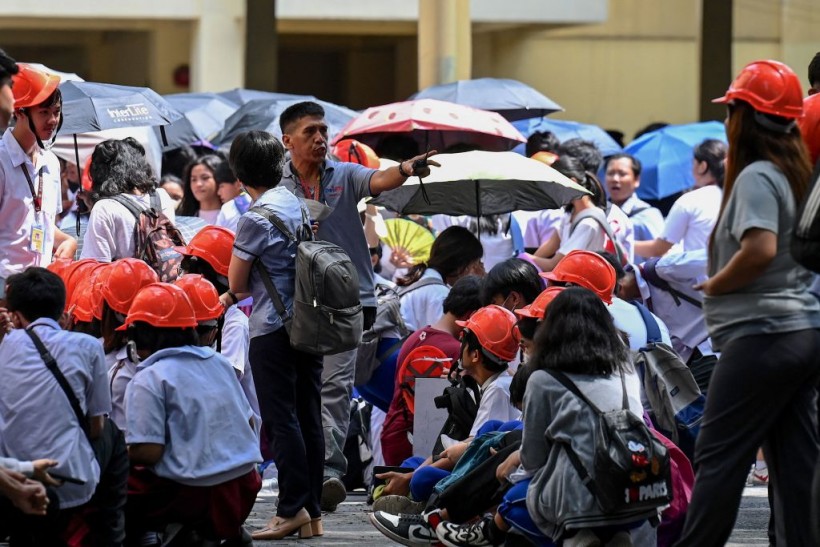The latest report showed no damages or casualties after a 6.3 magnitude earthquake struck the Philippines.
Reuters and ABC News report that s 6.3 magnitude earthquake hit at 126 kilometers dept (10:19 a.m).
The country's seismology agency said that there could be aftershocks.
6.3 magnitude earthquake in the Philippines
Based on the reports, the 6.3 earthquakes did not cause major damage or casualties. However, it was felt in parts of other provinces.

Evacuations in a building in Manila. The latest report said that a 6.3 magnitude earthquake hit the Philippines. Reports showed that no casualties or major damage occurred. Classes were suspended in Calatagan, Batangas
The railway operations were temporarily stopped due to the earthquake.
According to Reuters, Assistant Secretary Bernardo Rafaelito Alejandro, Civil defense spokesperson, explained that the airport and railways were suspended.
On the other hand, CNN Philippines reported a 6.3-magnitude earthquake resulted in the class suspension in Calatagan, Batangas.
Meanwhile, the Batangas Provincial Disaster Risk Reduction and Management Office added that Calatagan felt the earthquake's aftershocks at 11:15 a.m
The report explained that authorities would check for the possible damage of the earthquake on buildings and schools.
Earthquakes safety
Earthquakes can become powerful with aftershocks that could result in significant to major damage to buildings.
As a result, communities and homeowners should stay calm and prepared if an earthquake unfolds. Although earthquakes could be hard to predict, staying prepared would avoid possible casualties and injuries.
The Red Cross emphasized the importance of staying safe during earthquakes because the situation could become rapid and dangerous.
Also Read: Is it Possible to Predict Earthquakes? Scientists Look for Ways to Detect Early Warnings.
The report explained that injuries or deaths could occur when people could suffer from falling debris or walk to shaking areas.
Furthermore, the report noted that earthquakes could cause landslides, tsunamis and significant damage to power lines and communications.
Prepare an emergency plan at your home.
Homeowners should keep updated with earthquake alerts, especially if they live near the coasts. Preparing multiple information, radios, televisions, or earthquake announcements could help to anticipate the earthquake's impact.
Furthermore, communities should prepare earthquake emergency plans.
Drop, Cover and Hold
The advisory noted the importance of practicing Drop, Cover and Hold. It can help people to avoid possible injuries from flying or falling debris.
Covering your head will protect you from any debris. Meanwhile, it is best to find a safe area to hold until the quake shaking finally stops.
Prepare emergency kits at home.
Evacuations could also become possible when an earthquake emerges. Emergency kits could become helpful when roads become inaccessible due to the quakes.
Here are essential emergency kits that you could also keep: battery-powered radios, non-perishable food supplies, bottled water, battery-powered radio, medicine kits and battery-powered flashlights.
Homeowners could also check their homes for anything that could fall during the powerful earthquakes. It is best to secure them to avoid falling.
Red Cross also added that your homes or buildings should pass the earthquake evaluation from authorities.
Wait until the shaking stops.
Staying in a secure area is helpful. Homeowners must wait until the shaking stops before they leave their homes.
Related Article: Japan Earthquake: 6.2 Magnitude Impacts Island Hokkaido; No Tsunami Alerts Reported
For more news, don't forget to follow Nature World News.
© 2024 NatureWorldNews.com All rights reserved. Do not reproduce without permission.

![Tsunami Hazard Zones: New US Map Shows Places at Risk of Flooding and Tsunamis Amid Rising Sea Levels [NOAA]](https://1471793142.rsc.cdn77.org/data/thumbs/full/70325/280/157/50/40/tsunami-hazard-zones-new-us-map-shows-places-at-risk-of-flooding-and-tsunamis-amid-rising-sea-levels-noaa.jpg)



